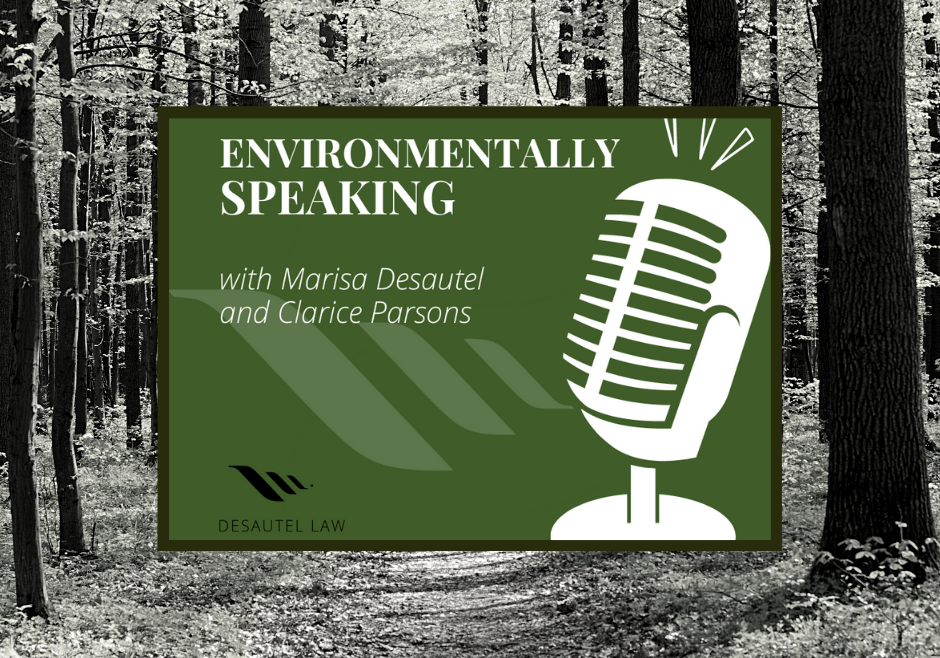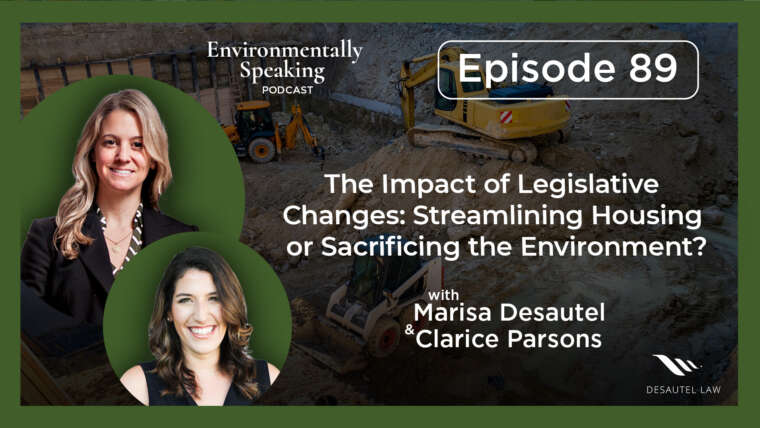LISTEN NOW:
EP 012 – Public Beach Access
MARISA: Hi, everybody. Welcome to Environmentally Speaking. I’m Marisa Desautel an environmental attorney with a few decades of experience. I’m cracking up because, Clarice, every time I say, hi everyone, you get this look on your face.
CLARICE: I think it’s the funniest thing. I know we’re addressing all of your guys who clearly aren’t right in front of us, but it just cracks me right up. It’s talking to an empty room. The two of us are both in our offices totally alone and we’re just like announcing into the either, hey, everybody. And it makes me so happy. So, hi, guys. It’s Clarice bringing the questions, topics, funny musings, and whatever else we can think of to the table today.
MARISA: What are we talking about today? I think we got a request, right?
CLARICE: We do. We have a request. So if you guys remember from our Superfund site episode which was our super bummer episode, a friend of mine Zack requested to talk about that and he’s come back again to ask about –
MARISA: Oh, Zack.
CLARICE: Yes. He’s come back to ask about –
MARISA: Zack attack.
CLARICE: — public beach access and, yeah. Just talking a little bit about who can go to the beach and where we’re allowed to.
MARISA: You know, Rhode Island being a coastal state I guess it makes sense that people get really worked up about public access to the shoreline, but it’s a very hot topic in Rhode Island and has been for a couple of years and that is because, I think, of recent litigation where the Rhode Island attorney general’s office got involved with – I believe it was a declaratory judgment action where they wanted the state court system to declare that the public had more rights to [inaudible] shoreline access than property owners who own those shoreline parcels actually do. And it’s a question that is governed by the Rhode Island Constitution. I don’t know if you knew that, but Rhode Island has its own separate state constitution. It drafted hundreds of years ago. And clearly even back then public access to the shoreline was an issue because the state access to the shore is in Article 1, Section 17 of the Rhode Island Constitution.
[0:02:49] CLARICE: That’s really up there.
MARISA: Yeah. It talks about how the public shall have rights to fish from the shore, gathering seaweed which seems kind of a random activity but actually it goes back to the historical use of seaweed as a crop fertilizer in Rhode Island including whole lobsters. People used whole dead lobsters as fertilizer. They weren’t eaten because they were considered rats of the ocean. Isn’t that wild?
CLARICE: Well, in Maine when Maine first started they fed the prisoners lobsters and that was ruled inappropriate as cruel and unusual punishment.
MARISA: Right.
CLARICE: And now we’re paying 30 plus bucks just to eat their tails.
MARISA: Well, I did not know that. Cruel and unusual, okay. I’m vegetarian, so that makes sense to me. But the constitution also covers access to the sea for swimming and passage along the shore which make a lot of sense. So these rights of way are considered part of something called the Public Trust Doctrine which essentially says that the state holds title to these lands in trust for the public’s use. The issue arises about access when you’ve got a private landowner who owns a piece of property directly on the ocean or, you know, adjacent to the setback to the ocean and gets upset when people are laying on the beach in front of their house or gathering shells or fishing. So that’s where a lot of the civil action around this particular topic comes into play. Does that all make sense?
CLARICE: It does. But my follow-up question is when that person bought their waterfront property doesn’t their deed tell them how far they own?
MARISA: The Public Trust Doctrine tells them that they own from their lot line to the mean high tide water mark. So obviously that distance changes depending on the time of day. I mean, it doesn’t – excuse me. Let me back up. It doesn’t change on the time of day. Your mean high water mark is the same in theory every single day, but how do you as a nonproperty owner if you’re just someone on the beach or trying to switch or fish – how do you know where they mark is. And so that’s become the focal point for a lot of litigation, as well.
CLARICE: So what’s moving — is Rhode Island currently – I know that it’s active litigation, so is Rhode Island leaning one way. Like you said, they’re becoming a little bit more pro public access. What is that starting to look like?
[0:05:50] MARISA: The recent litigation which I believe is over had to do with the CRMC’s objectives as well as some – some of it was political, but one of the CRMC’s objectives is to safeguard the opportunities for public access for recreational historical aesthetic purposes. I mean, that comes from the Coastal Zone Management Act which is the federal statute that guides the CRMC. And under that statute the CRMC has been taking a look at what the rights of way are for the different beach access points in the state as well as coastal trails, boardwalks, and fencing in coastal areas, how that impacts the public’s ability to actually get to the shoreline. So it’s a hot topic probably also because land development is getting to be more difficult as we continue to build subdivisions and build up along the coastline. With climate change being the way that it is, people are very – what’s the word – squirrely about their property ownership rights. And we’re seeing more litigation at the state level concerning these issues.
CLARICE: And I think you’re touching on a great point especially with climate change and, you know, the ever-changing nature of these coastal areas and how important it is to preserve them. Just two months ago my husband and I went to a beach that we used to go to every year and this year the beach was gone. So, I mean, it’s one of those things that we think of in a nebulous fashion until you go to your favorite yearly spot and it doesn’t exist anymore.
MARISA: Yeah.
CLARICE: So, you know, I can see the need to go back and review the legislation and talk about what access rights are because just by the nature there’s less and less access through ownership and through existence.
MARISA: Yeah.
CLARICE: So is there is situation where – and I’m sure it depends is going to be the incoming answer. I can feel it in my bones. Is there a situation where you may own a part of a beach and like you said you own up to that mean water line or high tide line and people still have access to it? So can people still go onto that portion of the beach as long as they’re within those lines?
[0:08:31] MARISA: In theory, yeah. It depends on what type of activity they’re undertaking, though. They can’t lay down on a towel. They can recreate. They can walk. They can fish. It just depends on the activity. I think the most recent case on this issue was out of Westerly where the attorney general’s office looked at whether a stretch of beach in Westerly was actually dedicated to the public by the property owners because sometimes with real property conveyances you can include an easement or a right of way in perpetuity so that the public does maintain more access than is customarily recognized under the public trust doctrine. So I believe in that case the court talked about how public access was being made more difficult recently because of the public portion of the beach being partially under water as a result of sea level rise. I mean, even the court is struggling with how to look at these cases.
CLARICE: I could see that being more difficult, yeah. You get to be on this part of the beach that’s, you know –
MARISA: Under water.
CLARICE: — up to your knees under water.
MARISA: Yeah. Yeah.
CLARICE: I can see where, you know, the use and enjoyment is disturbed and that purpose is kind of moot at that point.
MARISA: I think that was the last case on the issue. And now the CRMC is undergoing some study of reorganization by a special house commission in Rhode Island. So I bring that up because the oversight that CRMC provides is so important. They’re the state regulatory agency that handles enforcement and permitting as well as public trust cases including aquaculture projects that they’re permitting. And there have been some questions recently about the transparency with the processes that they’re undertaking and it’s hopeful that the commission will put forth a recommendation and study on potential reorganization by April 1st of next year. So that is actively ongoing.
[0:11:11] CLARICE: And that’s sooner than I expected.
MARISA: Yeah.
CLARICE: April of next year really isn’t that far away.
MARISA: It’s really not. It’s going to come up quick. So that’s all I’ve got for public trust and shoreline access.
CLARICE: Yeah. No. I think a good summation of this would probably be that even though access is changing it sounds like the restructuring of the agency that oversees what access looks like is also changing.
MARISA: Potentially, potentially. Who knows.
CLARICE: Potentially changing and so is the tide, so.
MARISA: Yeah.
CLARICE: Nothing is certain and sit on your beach while you have it.
MARISA: Yeah. Good advice.
CLARICE: All right, everybody. That is today’s episode. If you have any topics, comments, things you want to write in, feel free to e-mail us at Help@DesautelESQ.com. Hit us up on Instagram. Like and subscribe. I’m told those are important for our metrics, but I don’t actually know what those metrics are so [inaudible]. Have a good one, everybody.
MARISA: Thanks. Bye.
CLARICE: Bye.




